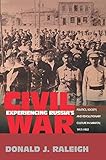Experiencing Russia's Civil War : Politics, Society, and Revolutionary Culture in Saratov, 1917-1922 / Donald J. Raleigh.
Material type: TextPublisher: Princeton, NJ : Princeton University Press, [2021]Copyright date: ©2003Description: 1 online resource (464 p.) : 17 tables. 29 halftones. 2 mapsContent type:
TextPublisher: Princeton, NJ : Princeton University Press, [2021]Copyright date: ©2003Description: 1 online resource (464 p.) : 17 tables. 29 halftones. 2 mapsContent type: - 9781400843749
- HISTORY / Russia & the Former Soviet Union
- ABC of Communism
- Atkarsk
- Balashov
- Black Hundreds
- Bolsheviks
- Capitalism
- Center-periphery relations
- Dashkovtsy
- Ivanovo-Voznesensk
- Jews
- Kalmyks
- Kamyshin
- Khvalynsk
- Mensheviks
- absenteeism
- abuse of power
- anarchists
- anti-bourgeois attitudes
- bourgeoisie
- bureaucratic centralism
- censorship
- centralization
- coercion
- colonialism
- counterrevolution
- demobilization
- democracy
- deurbanization
- economic conditions
- elections
- factionalism
- food brigades
- foreigners
- frontoviki
- garrison
- goods exchange
- gubispolkom
- gubkom
- harvest
- hidden transcripts
- hostages
- ideology
- industrial production
- kulaks
- labor exchange
- land redistribution
- living conditions
- lower classes
- mass discontent
- mass spectacles
- militarization
- mobilizations
- 947/.460841 21
- DK265.8.S37
- DK265.8.S37
- online - DeGruyter
| Item type | Current library | Call number | URL | Status | Notes | Barcode | |
|---|---|---|---|---|---|---|---|
 eBook
eBook
|
Biblioteca "Angelicum" Pont. Univ. S.Tommaso d'Aquino Nuvola online | online - DeGruyter (Browse shelf(Opens below)) | Online access | Not for loan (Accesso limitato) | Accesso per gli utenti autorizzati / Access for authorized users | (dgr)9781400843749 |
Frontmatter -- Contents -- Illustrations -- Tables -- Acknowledgments -- Glossary and Abbreviations Used in Archival Citations -- Introduction: Experiencing Russia's Civil War -- Part One POLITICS -- 1. Revolution on the Volga -- 2. Languages of Power: How the Saratov Bolsheviks Imagined Their Enemies -- 3. The Rise and Fall of the Saratov "Republic" -- 4. Cadres Resolve All: The Communists in Power -- 5. Co-optation amid Repression: The Revolutionary Communists and Other Socialist Parties in Saratov Province -- Part Two SOCIETY AND REVOLUTIONARY CULTURE -- 6. A Community in Disarray, a Community in the Making -- 7. The Cultural Practices of Provincial Communism -- 8. Narratives of Self and Other Saratov's Bourgeoisie -- 9. Not Seeing Like a State The Red Guard Assault on Capital -- 10. Peasants in a Workers' Revolution -- 11. "Given His Class Position, a Worker Can Be Nothing but a Communist" -- 12. A Provincial Kronstadt, Another Tambov? -- Conclusion -- Bibliographical Essay -- Index
restricted access online access with authorization star
http://purl.org/coar/access_right/c_16ec
This book is the only comprehensive history of the total experience of the Russian Civil War. Focusing on the key Volga city of Saratov and the surrounding region, Donald Raleigh is the first historian to fully show how the experience of civil war embedded itself into both the people's and the state's outlook and behavior. He demonstrates how and why the programs and ideals that had propelled the Bolsheviks into power were so quickly lost and the repressive Soviet party-state was born.Experiencing Russia's Civil War is based on exhaustive use of previously classified local and central archives. It is also bold and ambitious in its breadth of thematic coverage, dealing with all aspects of the war experience from institutional evolution and demographics to survival strategies. Complicating our understanding of this formative period, Raleigh provides compelling evidence that many features of the Soviet system that we associate with the Stalin era were already adumbrated and practiced by the early 1920s, as Bolshevism became closed to real alternatives. Raleigh interprets this as the consequence of a complex dynamic shaped by Russia's political tradition and culture, Bolshevik ideology, and dire political, economic, and military crises starting with World War I and strongly reinforced by the indelible, mythologized experience of survival in the Civil War.Fluidly written, replete with new information, and always engaged with important questions, this is history finely wrought.
Mode of access: Internet via World Wide Web.
In English.
Description based on online resource; title from PDF title page (publisher's Web site, viewed 01. Dez 2022)


